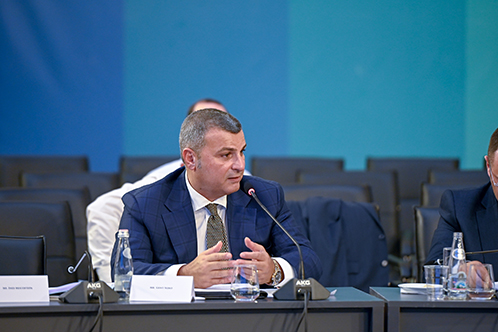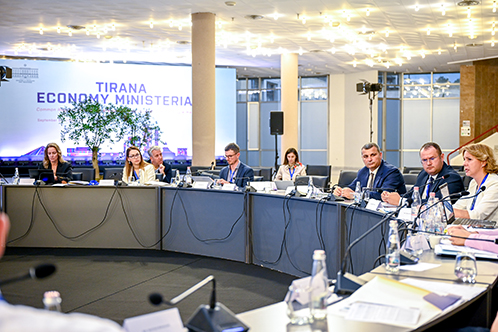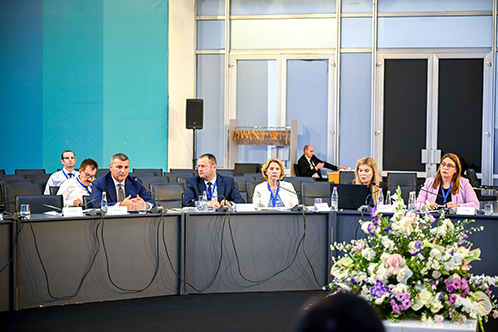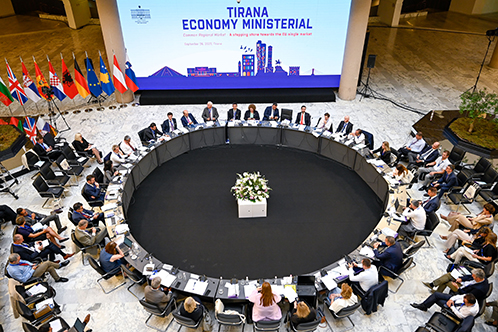BANK OF ALBANIA
PRESS RELEASE
Governor Sejko: Address to the Ministerial Forum on Economy, titled ''Common Regional Market - a step towards the EU Single Market'', hosted in Tirana
Publication date: 27.09.2023
Dear Minister Mete
Dear Mrs. Xiaoqing Yu
Dear Colleagues,
Dear Participants
It is a great pleasure and honor for me to be part of this momentous event, which highlights and promotes regional cooperation among Western Balkan countries, as a way to foster economic development and contribute to their integration with the European Union.

Yet, in order for this objective to be successfully achieved - advanced, modern and integrated payment services, systems and markets - need to be in place. Payment systems and payment markets are directly linked to and closely correlated with economic exchanges and efficient economic growth. While money is considered to be the lifeblood of modern monetary economies, payment systems are their circulatory system. In this light, modernization of payment systems is an immediate objective aiming to formalize and further develop our economies. Similarly, alignment with European practices is equally important, taking into account that EU integration is a shared and central objective for our six countries. Therefore, enhancing trade exchanges with other Western Balkan countries as well as with the European Union is of crucial importance.

We live in an era of open economies and deep globalization, with digitalization of cross-border payment systems assuming particular significance. Against this backdrop - having in place fast, transparent and cheap cross-border payments - is a globally-shared objective. Since the G20 Leaders endorsing the Roadmap for Enhancing Cross-border Payments in 2020, much has been realized in this regard.

On the same note, the Regional project for “Modernizing the payment system in Western Balkan counties” is in line with all of the above-mentioned objectives and promotes their advancement. This project consists of a number of supporting actions related to some of the objectives. They underpin the development of the Common Regional Market and the Economic Investment Plan for the Western Balkans. To that end, the six Western Balkan economies have committed to developing a Common Regional Market based on European Union rules and standards, with a view to increasing the Region’s attractiveness and competitiveness and bringing it closer to the EU markets.

At the same time, the European Commission has adopted a comprehensive Economic and Investment Plan for the Western Balkans, which aims to spur the long-term economic recovery of the region, support a green and digital transition, and foster regional integration and convergence with the European Union. The improvement of cross-border payments with non-EU jurisdictions, as well as efficient and interoperable retail payment systems, are also acknowledged in the recently adopted EU Retail Payments Strategy.
Some of the objectives of this project are to reduce costs for regional payments, prepare the region for joining the Single Euro Payment Area (SEPA), and create a domestic instant payment solution in those countries that do not have one yet. The ultimate goal is also to prepare them for joining TIPS, the instant payment system operated by the ECB.
In recent years, many concrete actions have been taken towards this goal. Albania and all the other countries in our region, in close cooperation with the World Bank, the EU and the Regional Cooperation Council have been working to comply fully with SEPA’s legal and regulatory requirements. The faster we move with compliance, the earlier we will see our countries join SEPA. On our end, the Bank of Albania has also intensified discussions with the World Bank and Banca d’Italia for setting up a domestic instant payment solution.
What are the benefits of achieving these objectives?
- Beyond the regional objectives and EU integration, a SEPA accession has a direct impact in the domestic markets and economy. As mentioned before, Albania has a very high level of exchange and interaction with EU economies. As a result, participation in SEPA will make imports and exports-related payments more efficient in terms of both cost and time.
- Moreover, it is expected to contribute positively to the rapidly growing Albanian tourism, while tourists will be able to pay faster and keep commissions cheaper. This would accelerate the already booming tourism, and will have a substantial contribution to the overall growth and attractiveness of Albania’s economy.
- Last but not least, SEPA accession translates into a concrete impact on remittances and in turn, on Albanian households’ disposable income. Taking into account recent migration out of Albania, as well as the size and position of the earlier Albanian diaspora present in EU countries, this facility may increase remittance flows through formalized channels, contribute to the formalization of the economy, and improve the well-being of receiving households in Albania.
I believe I speak many minds in this room if I share common challenges related to: lowering informality, reducing use of cash, boosting electronic payments, digitalizing services, enhancing financial inclusion, cutting poverty, and seamless government payments and services. Well, all these elements are addressed in project for which we are all working in the region to ensure Instant Payments 24/7 within seconds.
Implementation of a domestic instant payment solution for Albania is now incorporated in our National Retail Payment Strategy, undertaken and led by the Bank of Albania. It includes several national reforms and initiatives, aiming at addressing challenges such as informality, e-payments, and financial inclusion. With this infrastructure in place, the Albanian market would be able to significantly lower the use of cash formalization in the economy, and to be in line with a number of national strategies and initiatives. The infrastructure supports, among other things, initiatives of the Albanian government for faster and more efficient administration of Treasury payments, the promotion of e-commerce and further digitization of government payments in the single government gateway e-Albania.
In the past, such infrastructural reforms have proven to be very efficient for the Albanian economy and have been easily and quickly embraced by market players, in the light of recent reforms undertaken by the Bank of Albania. For example, thanks to recent developments in AIPS, a real-time gross settlement system at the Bank of Albania, the use of interbank transactions for euro domestic payments has seen a sharp increase. At the same time, savings for the economy are estimated to amount up to 10 million euros annually. Also, participation in SEPA would save Albanians around 14 million euros annually. Similarly, with the instant payment operational, costs for the economy would be down to 0.2% of the GDP, from 1.7% to GDP in the case of cash.
I would like to conclude by reiterating the importance of this Regional Project, emphasizing the necessity for all countries to intensify their efforts toward achieving common goals with benefits for all of our countries. I would also like to express my gratitude to our European and International partners, who always stand by our side to guide and support us to deliver tangible results.
Finally, I would like to express my highest appreciations to the Ministry of Finance and Economy for the organization of this very important event and raising awareness and discussions for a vital topic such as payment systems and the regional cooperation in the field. The Bank of Albania has always found the Ministry of Finance and Economy, and the Albanian Government, to be important partners and supporters in our journey to modernize domestic payment systems through the National Retail Payment Strategy (2018-2023).
Thank you!

 Twitter
Twitter
 Youtube
Youtube
 Facebook
Facebook
 Flickr
Flickr
 RSS
RSS
 Subscribe
Subscribe
 Feedback
Feedback